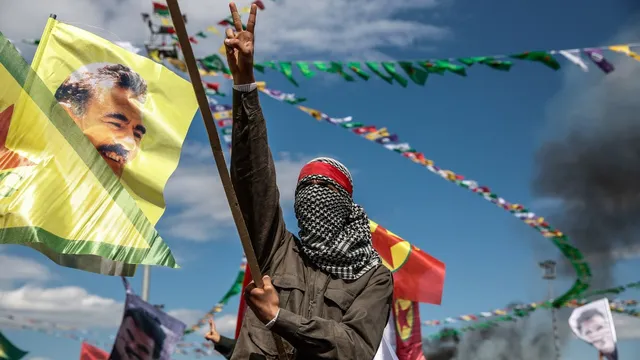
PKK declares ceasefire to promote peace in Turkey
2025-03-02 00:01- The PKK announced a ceasefire, aiming to follow a call from their leader Abdullah Ocalan to disarm.
- President Erdogan sees this moment as an important step towards repairing relations and achieving peace.
- Many in the Kurdish regions express cautious hope, considering the historical context of previous ceasefires.
Express your sentiment!
Insights
In a significant move towards peace, the Kurdistan Workers' Party (PKK) announced a ceasefire effective immediately as of Saturday, following a call from their imprisoned leader, Abdullah Ocalan, urging supporters to disarm. This declaration has raised hopes amid a longstanding conflict that has persisted for around 40 years between Kurdish militants and the Turkish state, primarily affecting southeast Turkey and northern Iraq. The ceasefire comes on the heels of President Recep Tayyip Erdogan’s acknowledgment of a ‘historic opportunity’ to mend relations and work towards ending what he referred to as the wall of terror, indicating a potential shift in the political landscape surrounding this issue. However, responses from the Kurdish community show a mix of hope and skepticism. Many families in Diyarbakir, which is at the heart of the Kurdish-majority region, expressed concerns about trusting the Turkish government based on historical grievances and past betrayals during peace negotiations. Items of desolation and bitterness commonly resound in testimonies from those who lost loved ones to the ongoing violence, signaling a cautious approach towards this new ceasefire agreement. As communities in the Kurdish region reflect on the potential for peace, those in northern Iraq, particularly in cities like Sulaymaniyah, received the news more positively, suggesting that both parties may have realized the crucial need for a change in rhetoric and strategy to halt the hostilities that have long beset the area.
Contexts
The conflict between the Kurdistan Workers' Party (PKK) and Turkey has a long and complex history, rooted in national, ethnic, and territorial disputes. The PKK was founded in 1978 and initially sought to address the political and cultural rights of Kurds in Turkey, advocating for an independent Kurdish state. However, the group's approach has evolved over the years, especially after the 1980 military coup in Turkey, which intensified state repression against Kurdish identity and political activism. In 1984, the PKK launched an insurgency against the Turkish state, which marked the beginning of a violent conflict that has since claimed tens of thousands of lives and led to significant socio-economic disruptions in the region. The PKK's tactics have included guerrilla warfare, bombings, and assassinations, while the Turkish military has responded with extensive operations targeting PKK strongholds, primarily in southeastern Turkey and northern Iraq, where the group has sought refuge. The Turkish state has historically viewed the PKK as a terrorist organization, labeling its fight for Kurdish autonomy as a threat to national integrity. This has led to a counter-insurgency policy characterized by military operations, cultural assimilation efforts, and political suppression of Kurdish rights. Despite these measures, the PKK has garnered significant support among Kurds, who feel disenfranchised and marginalized by the state. Over the years, peace negotiations have intermittently taken place, with notable attempts occurring in the early 1990s and again in 2013-2015, aimed at resolving the conflict through dialogue rather than violence. However, these efforts have often been derailed due to mutual distrust, political shifts, and escalations in violence. The regional and international context has also played a crucial role in the dynamics of the PKK-Turkey conflict. The ongoing civil war in Syria has created a complex web of alliances and enmities, particularly with the emergence of the Syrian Democratic Forces (SDF), which is closely linked to the PKK. Turkey perceives the SDF as an extension of the PKK and has conducted several military operations in northern Syria to counter what it sees as an extension of the PKK's influence. Moreover, the geopolitical interests of global powers, particularly the United States, which has collaborated with the SDF in the fight against ISIS, have further complicated Turkey's position and the prospects for a lasting resolution to the conflict. As of March 2025, the PKK-Turkey conflict remains unresolved, with a current climate marked by ongoing military confrontations and political tensions. While the PKK continues to push for greater autonomy and rights for Kurds, the Turkish government remains steadfast in its anti-PKK stance, showing little inclination towards renewed dialogue. The humanitarian impact of this prolonged conflict is considerable, affecting the Kurdish population through displacement, ongoing violence, and a lack of access to basic services. The path toward peace remains fraught with challenges, and the resolution of the PKK-Turkey conflict will require concerted efforts from all stakeholders, both domestically and internationally.